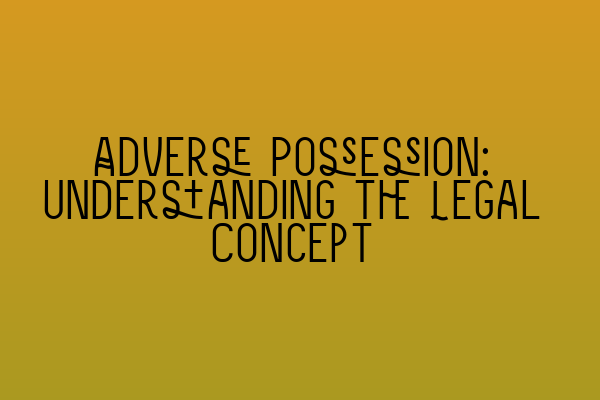Adverse Possession: Understanding the Legal Concept
Adverse possession is a fascinating legal concept that has long fascinated property law enthusiasts and legal professionals. It is a principle that allows a person to gain legal ownership of property that they have occupied and used for an extended period of time, without having any legal title or permission to do so. In this blog post, we will dive deep into the concept of adverse possession, exploring its history, requirements, and implications in property law.
The History of Adverse Possession
The concept of adverse possession has its roots in ancient legal systems, where land ownership and property rights were not as well-defined as they are today. Over time, the principle developed as a way to balance the need for legal certainty with the practical reality of land use and occupation. Today, it is an essential part of property law in many jurisdictions, including the United Kingdom.
Requirements for Adverse Possession
In order to successfully claim adverse possession, certain requirements must be met. These requirements differ from jurisdiction to jurisdiction, but some common elements include:
- Actual Possession: The claimant must have actual physical possession of the property. This means that they must physically occupy and use the property as if they were the legal owner.
- Exclusive Possession: The claimant must possess the property exclusively, meaning that they must exclude others from using or occupying the property.
- Open and Notorious Possession: The claimant’s possession must be open and obvious to the true owner and the public. They cannot be hiding their occupation or using the property in secret.
- Continuous Possession: The claimant must possess the property continuously for a specified period of time, usually ranging from a few years to several decades, depending on the jurisdiction.
- Hostile Possession: The claimant must possess the property without the true owner’s permission, known as “adversely” to the owner’s interests.
Meeting these requirements is crucial for a successful adverse possession claim. It is important to seek legal advice and understand the specific requirements that apply in your jurisdiction.
Implications of Adverse Possession
Adverse possession can have significant implications for both the claimant and the true owner of the property. For the claimant, a successful adverse possession claim can result in the acquisition of legal ownership rights, allowing them to sell, mortgage, or otherwise deal with the property as if they were the original owner. On the other hand, the true owner may lose their rights to the property if they do not take legal action to prevent the claimant from acquiring adverse possession.
Given the potential consequences, it is essential for property owners to be aware of their rights and take appropriate action if they suspect adverse possession is taking place on their property. Seeking legal advice and understanding the time limits and procedures for challenging adverse possession claims is crucial to protecting one’s property rights.
Conclusion
Adverse possession is a complex and intriguing legal concept that plays a significant role in property law. Understanding its history, requirements, and implications is essential for both property owners and those seeking to claim adverse possession. If you find yourself in a situation involving adverse possession, it is highly recommended to consult with a qualified solicitor who specializes in property law to navigate through the intricate legal process.
For more information on SQE preparation, practice exams, and exam dates, please visit our related articles:
